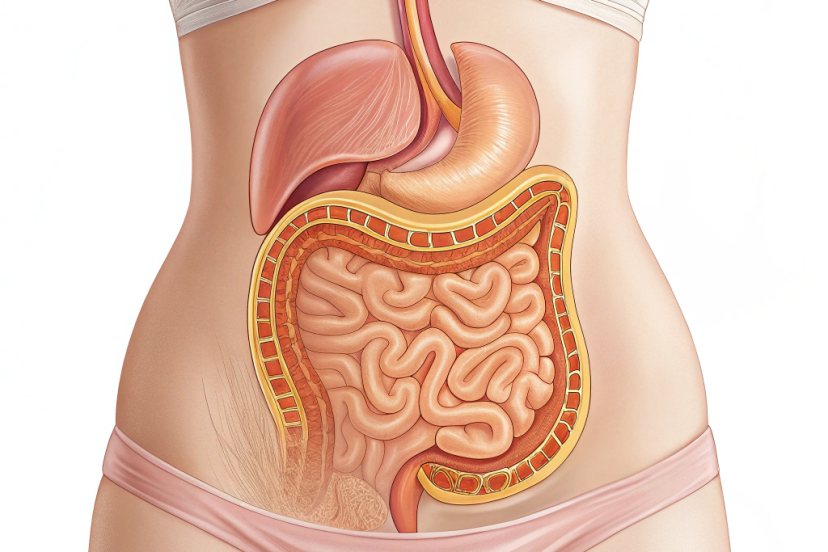Gut Health and Hormones: What Women Should Know
Our hormones — estrogen, progesterone, thyroid hormones, insulin, cortisol — shape mood, energy, weight, skin, menstrual cycles and fertility. What many women don’t know is that a large part of hormone regulation happens outside the endocrine glands: inside the gut. In plain language, the trillions of bacteria living in your intestines help control how hormones are processed, reused, and balanced. This article explains the science in simple terms, shows why it matters for women at every life stage, and gives practical steps backed by research to support both gut health and hormone health.
What is the gut microbiome, and why does it matter for hormones?
Your gut microbiome is a community of bacteria, yeasts and other microbes that live mainly in the large intestine. They help digest food, make vitamins, train the immune system and produce signaling molecules that talk to other organs — including hormone-producing glands.
Some gut bacteria produce enzymes that change hormones chemically. For example, certain bacterial enzymes can free up estrogen that the body previously prepared for elimination, allowing it to be reabsorbed into the bloodstream. That recycling can raise or prolong estrogen exposure in the body — which matters for menstrual health, menopause symptoms, bone health and some hormone-sensitive conditions. This set of bacterial genes that influence estrogen processing is sometimes called the “estrobolome.”
How the gut changes estrogen
A key mechanism is an enzyme many gut bacteria make called β-glucuronidase. The liver tags estrogen (and other molecules) with a sugar-like group to make them water-soluble so they can be excreted. Gut bacteria with β-glucuronidase can remove that tag, freeing the estrogen so it can be reabsorbed — a process called enterohepatic recycling. Depending on which bacteria are present and how active they are, this recycling can tilt the balance of circulating estrogens. That’s why two women with identical estrogen production in their ovaries might still have different blood estrogen levels — the gut is part of the story.
Gut dysbiosis and common women’s hormone conditions
When the microbiome is out of balance — called dysbiosis — it can contribute to or worsen several endocrine conditions common in women:
- Polycystic Ovary Syndrome (PCOS):
Women with PCOS often have different gut bacterial patterns compared with women without PCOS. Dysbiosis can contribute to inflammation and insulin resistance, two drivers of PCOS symptoms (irregular periods, acne, unwanted hair, weight gain). Some studies suggest modifying the gut flora could improve metabolic and hormonal signs of PCOS.
- Thyroid autoimmunity (Hashimoto’s) and thyroid function:
The gut influences thyroid health in multiple ways: by affecting iodine and selenium absorption, modulating immune responses, and even by interacting with thyroid hormone binding and conversion. Alterations in gut microbiota have been linked with autoimmune thyroid disease in studies, suggesting the gut may play a role in who develops thyroid autoimmunity and how severe it becomes. - Menopause and estrogen-related symptoms:
As estrogen levels fall in menopause, gut composition also shifts. Because the gut helps recycle estrogens, a healthier estrobolome may support a more favorable estrogen balance during the transitional years, potentially affecting hot flashes, bone health and metabolic risk.
Stress hormones, the gut-brain axis and menstrual cycles

The gut and brain are in constant two-way communication (the gut-brain axis). Stress increases cortisol (the body’s main stress hormone), which alters gut motility, reduces barrier integrity, and shifts bacterial communities. Those gut changes then feed back and can make mood symptoms, sleep problems and menstrual irregularities worse. In short: chronic stress → altered gut → worse hormone regulation → more stress — a loop many women experience. Multiple reviews show this bidirectional communication affects mental health and endocrine function.
How strong is the evidence?
Research linking gut microbes to hormones includes animal experiments, human association studies, and emerging clinical trials. While the field is new, consistent patterns have appeared: specific bacterial families and microbial activities (like β-glucuronidase production) repeat across studies, and people with hormonal disorders often show distinct microbiome signatures. Systematic reviews have summarized these links and called for larger, controlled human trials to show cause-and-effect and to test microbiome-directed treatments.
Practical steps to support both gut health and hormone balance
You don’t need fancy tests to improve your gut-hormone connection. Here are evidence-friendly, low-risk steps:
- Eat a fiber-rich, plant-forward diet.
Fiber feeds beneficial gut bacteria and increases production of short-chain fatty acids (SCFAs) that reduce inflammation and support metabolic hormones. Aim for a variety of vegetables, fruits, legumes, whole grains and nuts. Multiple studies link higher dietary fiber with healthier microbiome profiles and improved hormone-related outcomes. - Choose fermented foods and consider probiotics when appropriate.
Yogurt, kefir, tempeh, sauerkraut and kimchi introduce live microbes or support microbial diversity. Some probiotic strains have shown benefits in metabolic health and inflammation — both relevant to hormone disorders. Probiotics aren’t a universal fix but can be helpful as part of an overall plan. - Cut down on added sugars and ultra-processed foods.
Diets high in refined sugars and processed foods tend to reduce microbial diversity and promote inflammation, which worsens insulin resistance and can disrupt the hormonal milieu. - Limit unnecessary antibiotics and optimize medication use.
Antibiotics profoundly change gut bacteria. Use them when needed but discuss alternatives or protective strategies with your clinician. Some other medications (proton pump inhibitors, certain laxatives) also affect the microbiome. - Prioritize sleep, movement, and stress management.
Regular exercise improves microbial diversity and insulin sensitivity. Good sleep and stress reduction (mindfulness, therapy, breathwork) lower cortisol spikes that harm gut integrity. - Work with clinicians for targeted strategies.
For conditions like PCOS or autoimmune thyroid disease, a combined approach (medical treatment + diet + microbiome-supporting habits) typically works best. Emerging therapies — such as targeted probiotics, fecal microbiota transplant (in research contexts), and dietary interventions — are being tested but need more evidence before broad use.
Thyroid Tests Say “Normal” But You Feel Terrible?
Here’s why
When to get medical help
If you have persistent symptoms — irregular periods, severe PMS, unexplained weight changes, hair loss, persistent fatigue, or signs of thyroid dysfunction — see a healthcare provider. Tests (blood work, thyroid antibodies, glucose/insulin measures) and individualized treatment matter. While improving gut health is helpful, it should complement, not replace, medical care for diagnosed conditions.
Simple at-home actions you can start this week for your gut health
- Add one extra vegetable or a serving of legumes to one meal each day.
- Swap a sugary snack for a handful of nuts or a piece of fruit.
- Try one fermented food (a few tablespoons of yogurt or sauerkraut) three times this week.
- Practice a 10-minute walk or gentle movement after dinner to support digestion and glucose control.
- Turn off screens 30 minutes before bed and aim for consistent sleep times.
How To Recharge Your Thyroid 3X Faster Even While Sleeping
What scientists still need to learn
The field is advancing fast, but questions remain: Which exact bacterial strains are most helpful for specific hormone problems? Can we reliably alter estrogen levels by changing the microbiome? Which probiotic formulas work for PCOS, menopause symptoms, or thyroid autoimmunity? Large, long-term human trials are underway to answer these. For now, combining proven lifestyle steps with standard medical care is the safest, most effective route.
Bottom line
Gut health and hormones are tightly linked. The bacteria in your gut influence how hormones are processed, recycled and sensed by the body. For women, that link affects periods, fertility, thyroid health, menopause and metabolic conditions like PCOS. You can’t control every factor (genes, age, some illnesses), but you can support a healthy microbiome through a fiber-rich diet, fermented foods, mindful lifestyle changes and good medical care. Small, consistent changes often lead to meaningful improvements in energy, mood, cycle regularity and overall well-being.
Related Articles
- How To Balance Hormones Naturally
- Best Menopause Supplements That Changed My Life
- How to Get Rid of Brain Fog During Menopause
- Why Ashwagandha Gummies Are Revolutionizing Stress Relief
FAQs
1. Can taking probiotics balance my hormones?
Probiotics can support gut health and reduce inflammation, which indirectly helps hormonal regulation. Some probiotic strains have shown promise for metabolic health and mood, but they are not a guaranteed “hormone balancer.” Choose probiotics as one part of an overall plan (diet, sleep, exercise) and consult your clinician for targeted advice.
2. Will changing my diet change my estrogen levels?
Diet can influence the gut microbes that help recycle estrogen. A fiber-rich, plant-forward diet and foods that support microbial diversity can affect estrogen metabolism over time, but changes happen gradually and interact with individual factors like age and liver function.
3. Are there tests to check if my gut is affecting my hormones?
There are microbiome sequencing tests available commercially, but their clinical value is still limited. Blood tests for hormones and markers of inflammation, plus clinical evaluation, remain the cornerstone. If you use a microbiome test, discuss results with a knowledgeable clinician.
4. Could fixing my gut cure PCOS or Hashimoto’s?
Improving gut health may improve symptoms and metabolic risk factors, but it’s unlikely to be a standalone cure. PCOS and autoimmune thyroid disease are complex and typically need a combination of medical treatments, lifestyle changes, and sometimes specialist care.
5. What’s one simple change I can start with today?
Add a serving of fiber-rich vegetables or a cup of legumes to one meal. It’s an easy habit that feeds beneficial gut bacteria and supports blood sugar and hormonal health right away.
6. Can gut problems cause low estrogen or early menopause?
While gut problems alone don’t typically cause early menopause, chronic gut inflammation and dysbiosis can worsen menopausal symptoms and potentially affect hormone levels. Severe gut conditions may impair nutrient absorption crucial for hormone production, and chronic inflammation can disrupt normal endocrine function. If you’re experiencing symptoms of low estrogen alongside gut issues, comprehensive evaluation by a healthcare provider is recommended.
7. How long does it take to improve gut health and see hormonal benefits?
Most people begin noticing digestive improvements within 2-4 weeks of implementing gut-supportive changes, but significant hormonal shifts typically require 3-6 months of consistent effort. The gut lining can regenerate every 3-5 days, but rebalancing the microbiome and allowing hormonal systems to recalibrate takes longer. Be patient and track symptoms monthly rather than daily to observe meaningful patterns.
References (selected):
Key scientific reviews and studies summarizing this topic include work on the estrobolome and estrogen metabolism, research on β-glucuronidase and estrogen recycling, reviews linking gut microbiota with PCOS, and studies on the gut-thyroid axis. For further reading, see reviews by Kwa et al. on the intestinal microbiome and estrogen; systematic reviews of sex hormones and gut microbiota associations; Lancet/eClinicalMedicine analyses of gut microbiota in PCOS; and comprehensive reviews of the gut-thyroid axis.






